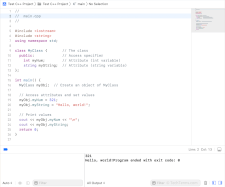C++
C++ (pronounced "C plus plus") is general-purpose programming language, created as an extension of the original C language. It uses nearly identical syntax to C but adds new features for object-oriented programming. It also includes more advanced memory management features, like dynamic memory allocation, and a more comprehensive standard library of pre-written functions.
Introduced in 1985, C++ is still one of the most widely used programming languages for developing software. It retains many of the low-level capabilities of C that allow developers to quickly and efficiently access the computer's hardware and memory. This makes C++ a useful language for developing operating systems, embedded IoT software, and video games.
Since C++ is an extension of the original C language, the two languages share most of their syntax. Like C, C++ is a compiled language that requires a program's source code to be compiled into machine language before it can run. Both are structured programming languages that divide programs into small functions or modules, and they share the same control structures like loops, if-else statements, and switch statements.
 Test Your Knowledge
Test Your Knowledge